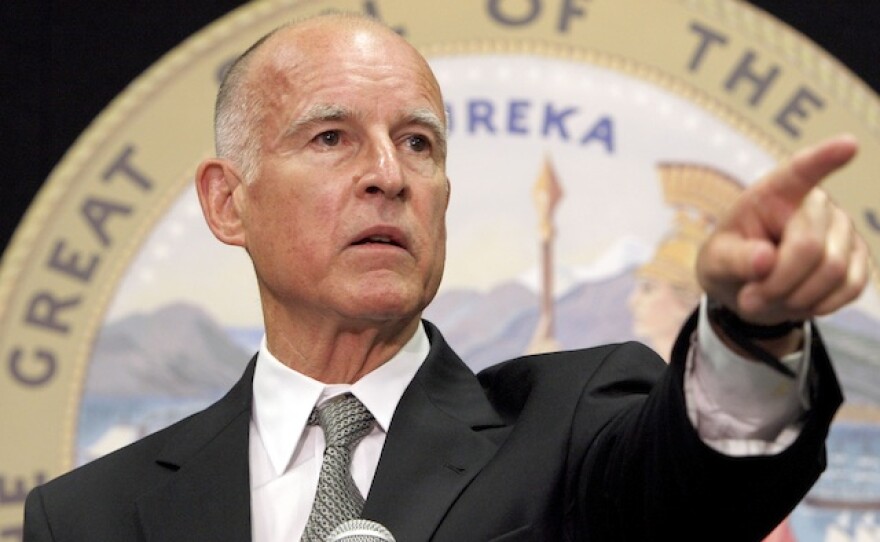A San Francisco judge is expected to decide early next month whether to force the California Public Utilities Commission to release more than 60 communications between the regulatory body and Gov. Jerry Brown’s office.
The documents are about the failure of the San Onofre Nuclear Generating Station and who should cover the costs.
One email that has already been released raises questions about whether the governor was taking Southern California Edison’s side while others sought a criminal investigation of the company.
First, some context.
San Onofre’s new steam generators were supposed to last 40 years.
But less than one year after they were installed, hundreds of tubes had shown wear, causing a radioactive leak in January 2012. The leak forced the plant’s closure and stuck San Diego and other Southern California ratepayers with a multibillion-dollar bill.
By May 2013, U.S. Sen. Barbara Boxer had in her possession two key documents. They showed that Edison officials knew there was potential for premature tube wear before those steam generators were installed but didn’t allow for fixes. One reason, according to internal documents, was that the company wanted to avoid a rigorous government review.
Boxer was incensed.
The California Democrat called on the U.S. Justice Department to open a criminal investigation into whether Edison had lied to federal regulators about what it knew before the faulty equipment was turned on.
“At that point, it was clear that things had gone very seriously awry,” said John Geesman, an attorney for the Alliance for Nuclear Responsibility, a watchdog group monitoring the San Onofre saga.
Geesman said a proper federal criminal probe would have included sworn testimony from the Edison executives and engineers responsible for managing and designing the steam generators.
Boxer never got that inquiry.
Correspondence suggests Brown did not back Boxer.
Nine days after Boxer called for a criminal investigation of Edison, the utility's CEO, Ted Craver, wrote an email to his board of directors in which he said that Brown took time out from a visit with President Barack Obama in Rancho Mirage to phone Craver.
Craver wrote that Brown asked him if he planned to “blast Boxer.”
Evan Westrup, Brown’s spokesman, told KPBS on Monday that the governor never asked Craver that question.
Craver went on in his email to write that he told Brown on the phone that he would not blast Boxer but instead planned to “take the high road.”
Just months before that email, one of Craver’s colleagues had met in secret in Poland with then-CPUC President Michael Peevey. It was there that the two devised a framework for a settlement that ultimately charged customers $3.3 billion for San Onofre’s shutdown costs.
“There are a number of statutes that Edison has quite intentionally violated,” Geesman said.
The public was never told about the Poland meeting until this past January, when a San Francisco judge believed there was probable cause that felonies had been committed.
A search of Peevey's home turned up notes from the meeting that nearly matched the terms of the deal approved by Brown’s appointees on the CPUC. The notes included a requirement for the regulatory commission to end any investigation of what Edison knew about the failed steam generators and when.
Geesman said customers have fared poorly.
“They’ve been hosed,” he said. “Regulators have not only allowed that to happen but actually encouraged it to happen by not investigating, by being indifferent to what caused the problem in the first place.”
In the Edison email from Craver to his board of directors, he wrote that he asked Brown if he could tell reporters he thought the company was acting responsibly. Craver wrote that Brown “indicated a willingness to do that.”
San Diego consumer attorney Mike Aguirre said if that is true Brown picked the wrong side.
“What it says is the governor is more interested in keeping the support of Edison than he was in supporting the public’s right to not be burdened by Edison’s mistakes,” Aguirre said.
Craver also wrote that he had spoken to Peevey. Craver said he asked the CPUC president to “see if he could get the governor to say something supportive about our handling of the situation and looking forward.”
Aguirre wants a judge to force the CPUC to release 65 communications between the commission and Brown’s office regarding San Onofre. A central question is whether Peevey ever told the governor about the meeting in Poland with the Edison executive, which set the terms for the San Onofre settlement. That meeting is the subject of a criminal investigation by the California Attorney General’s Office.
Brown’s spokesman said Peevey did not tell the governor about that meeting.
Meanwhile, a series of bills intended to reform the CPUC passed the Legislature this year.
One would have compelled the commission to release the sought-after communications between regulators and Brown’s office on San Onofre.
The governor vetoed the reforms, calling them important but technical and conflicting.






